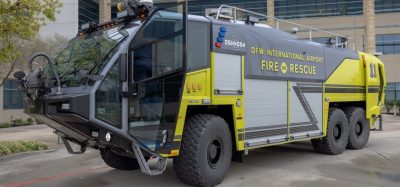Keeping up with the pace of rapid globalisation – “A challenge for the Airport Fire Service”
- Like
- Digg
- Del
- Tumblr
- VKontakte
- Buffer
- Love This
- Odnoklassniki
- Meneame
- Blogger
- Amazon
- Yahoo Mail
- Gmail
- AOL
- Newsvine
- HackerNews
- Evernote
- MySpace
- Mail.ru
- Viadeo
- Line
- Comments
- Yummly
- SMS
- Viber
- Telegram
- Subscribe
- Skype
- Facebook Messenger
- Kakao
- LiveJournal
- Yammer
- Edgar
- Fintel
- Mix
- Instapaper
- Copy Link
Posted: 29 September 2009 | Peggy Hinkel, Senior Executive Manager, Fire Training Centre, Fraport | No comments yet
As we look at airports around the world, we see the effects of globalisation. Airports are no longer airports. Globally, airports are evolving into “Airport Cities” pulsating with major development and expansion projects. They are becoming the “Market Places of today’s Economy” becoming “job generators” and the business place of major retailers, hotels, cargo forwarders, […]
As we look at airports around the world, we see the effects of globalisation. Airports are no longer airports. Globally, airports are evolving into “Airport Cities” pulsating with major development and expansion projects. They are becoming the “Market Places of today’s Economy” becoming “job generators” and the business place of major retailers, hotels, cargo forwarders, conference centres, public transportation facilities and living areas, just to mention a few. The rapid growth and expansion of these airports is a positive reflection towards the “Globalisation Move”, however the move into the global future and the rapid expansion and development of our airports present special and increased challenges for airport’s fire and emergency services.
Increased air traffic, coupled with expanding and growing hub operations, equates to increased risk potential.
Increased risk potential means we have to be aggressive in developing improved risk management plans commensurate with the rapid development of our “Airport Cities.”
The challenge for Airport Fire Services means that:
- The main tasks of Airport Fire Services are not only Aircraft Rescue Fire Fighting anymore.
- The responsibilities of Airport Fire Services are comparable with Civil Defence tasks like:
- Emergency Pre-Planning
- Fire Prevention Concepts
- Structural Fire Fighting
- High Rise Fire Fighting
- Emergency Medical Services
- Technical Rescue
- Confined Space Rescue
- Hazmat and Dangerous Goods
- Fire Warden Services
- The Airport Fire Services have to be involved in all kinds of the Airport City belongings. The Airport Fire Services must be involved with the airport’s expansion programme and must grow with the expansion.
Increased expansion and growth of an airport mandates the simultaneous growth and expansion of the airports fire and rescue service and this increased growth and expansion means that we need to consider “change management.” We need to ask ourselves: Are we doing business the right way? Can we become more effective? Are we happy with the “status quo” or do we need to make changes in our operational strategy as well as our management strategy?
How can we face the upcoming challenges:
- Within our organisational structure
- Within our management and leadership
- Within our staffing
- With our qualification and training standards
- Within our business development and ensure that we can continue to provide the highest quality of fire and rescue services to our customers?
The answers are simple. We as airport fire and rescue professionals simply need to become a part of “globalisation.” Lets face it, globalisation is here! We have to confront the challenges of globalisation head on, with power and force and institute “change management.” Change management doesn’t mean we have to change everything we do in our business, it simply means we need to evaluate what’s going on around us and be willing to implement the changes needed to cope with the ever increasing demands being placed on us.
We as airport fire protection professionals must take a more active role and become a critical player in the development of today’s globalised airport. We need to measure the “health” of our organisation to evaluate where change is due.
We need to:
- Adapt broader visions and need to have a closer look into the future in order to develop our strategic competences. That allows us to perform chance management of a high quality
- Ensure that we become involved in the master planning of the airport right from the start, to deal with the key issues:
- Conduct hazard and risk analysis to actualise the risk potential of our airport city
- Modify our standard operating procedures in terms of pre-emergency planning
- Acquisition of resources, based on the risk potential
- Qualification and training-competency based training
- Testing and maintaining our emergency response posture
- Increase fire department infrastructure (staff, facilities and equipment) commensurate with the airport master plan and risk potential. Increasing the fire department’s staff doesn’t only mean increasing the number of fire fighters in the shift. We have to modify our job performance requirements based on the enlarged responsibilities and tasks of our fire fighters, to ensure we get the “right” people for the right job.
- Modify training philosophies based on increased responsibilities and changes in fire fighting technology
- Aggressively push for the personal and professional development of our team. Emphasis should be placed on the human resource development of middle and top leadership of the fire and emergency services to ensure effective and efficient management of a more complex fire department system. Remember “Efficiency is doing the right task…but effectiveness is doing the right job!” Aircraft Rescue Fire Fighting is no-longer just putting “the wet stuff on the red stuff.” Even though technological advancements in our fire fighting machinery has taken us a long way, we still have room for improvement in our how we manage daily business and most importantly how we lead and manage our most valuable resource … our people. To perform a Human Resource Development is the first priority.
- Optimise “Networking” capabilities. Lets face it, the problems we face, we don’t face alone. Maybe one of our colleagues already found the best solution. We wouldn’t know if we didn’t ask. Become involved with one another and don’t be shy to share experiences. There is no room for “trade secrets” in our business! It is important to share information continuously around the globe:
- Participate in international training workshops to enforce standardisation of international training standards.
- Play an active role in international networking platforms to share incident experiences and get the chance to learn.
- Advancement in technology: Work closely together with manufacturers and technical fire fighting equipment providers. Enforce technical research based on the fire fighting needs of today.
- Operate your fire department like a business. Good business thinking always results in a better return on investment. We all know that the fire service department is always seen as a very expensive investment unit. But we also have to face the fact that business development doesn’t stop in front of the main entrance to a fire station. There is a great chance to develop the fire services like a business. The airport city provides a huge number of customers right in front of us. For every profit orientated enterprise, especially an airport, it would be a great opportunity to develop the fire fighting business like other airport services – and it is simple: you just need a good public relations and marketing strategy for the fire department’s main tasks.
Based on the different airport city “citizen” and customers like airlines, passengers, visitors, cargo handlers, airport staff, enterprises, institutions and governmental agencies, it is quite easy for a fire service department to provide focused product and service solutions in addition to the standard services provided.
From an organisational point of view, it can be useful to concentrate these customised services in a sub-unit that will be managed as a profit centre, to ensure a better return on investment for the fire service department.
Best practise in Frankfurt is evidence that this procedure really works.
Fraport decided to establish a Fire Training Centre (FTC) in 1996 as a sub-unit of the fire service department at Frankfurt Airport. The preliminary goal was to standardise and conduct the Aircraft Rescue Fire Fighting training for the staff of the fire department of Frankfurt Airport by themselves, to reduce the travel and training cost for sending the participant to other national and international training institutions.
Now Fraport’s Fire Training Centre (FTC) is an internationally recognised training institution and competence centre, which specialises in fire and emergency services training, life and fire safety consulting services and disabled aircraft recovery.
The standard and customised training programmes that will be provided through the FTC on-site at FRA and at the client’s location are focused to the customers:
- Situated on Frankfurt Airport (Airlines, cargo handlers, retailer)
- Other national German Airports and international clients, especially from international airports managed by Fraport.
Based on the standard services provided through an “Airport City Fire Department” it is simple to promote the main tasks like:
Training Services
- Aircraft Rescue & Fire Fighting Courses
- Basic Fire Fighter Courses
- Industrial Fire Fighter Training
- Emergency Medical Care
- Train-the-Trainer Courses
- Hazardous Materials Training
- Fire Warden Training
- Fire Prevention & Life Safety Seminars
- Disabled Aircraft Recovery Training
- Fire Extinguisher and Emergency Procedures Training
- Customised Training Courses & Seminars
Inspection and Survey Services
- Fire and explosion hazard analysis and audits
- Fire protection system inspection and testing
- Life safety analysis
- Evaluation of structural fire protection features
Emergency Response and Preparedness
- Review and development of emergency response plans and procedures
- Emergency organisation evaluation
Fire & Emergency Service Management & Organisation
- Human Resource Development Programmes
- Personnel Management, Employee Assessment & Career Progression
- Budgeting & Resource Management
Code and Standards Interpretation
- Liaison with enforcement officials
- Interpretation of national, state and local codes
Training
- Fundamentals in fire safety, fire protection systems, code applications and special hazards
- Emergency response planning and preparedness
- Fire Training Programmes and Facility Design
Fire Protection Standards Development
- Plant or corporate standards
- Fire safety systems and equipment specifications.
The Fire Training Centre in Frankfurt passes in excess of 2500 trainees a year. Managed as a profit centre the FTC is a success story and presents a good return on investment for Fraport and its Fire Department at Frankfurt Airport.
Effective management of our airport fire and rescue service begins with strong leadership and the willingness to be flexible to the changes in our operational environment. If we strive to accept change as a “natural” aspect in the evolution of today’s society and world development, we as leaders will succeed. Strong leaders face change as a positive management challenge. They use change to develop increased potential within themselves, as well as their team. They use change as a management tool, that if used effectively will ensure the professional growth of their team, and provide a solid management foundation for the organisation. This ensures the ability to provide continued “high quality and state-of-the-art” fire and rescue services to our customers.
















